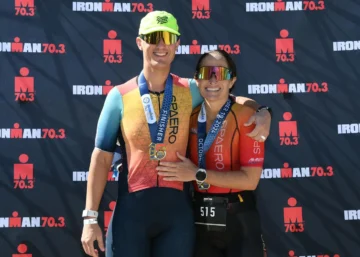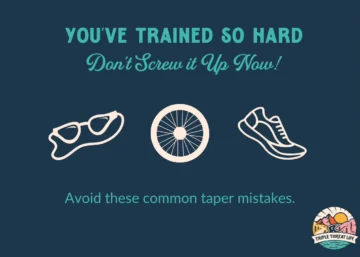
Triathletes are a fun bunch. Spending hours in spandex, talking watts and splits, chasing PRs and avoiding bonking, all while being powered by energy gels, salt tabs, and a questionable sense of sanity.
This sport is super specialized and, as a result, there are weird idiosyncrasies that only triathletes truly understand.
After having done this sport for 5 1/2 years now, I’ve heard my share of triathlon clichés.
- “Bike for show, run for dough!”
- “Nutrition is the fourth discipline of triathlon.”
- “An Ironman is just a long day…” (My husband really hates that one.)
All joking aside, there are 5 phrases that really annoy me. They pop up on social media daily, and it’s time to take them down. Some are ridiculous, some can be dangerous, and some are just downright stupid.
These are the 5 phrases to remove from your triathlon vocabulary.

1.“No pain, no gain”
Related phrases include: “Pain is temporary, but glory is forever” or “Pain is weakness leaving the body.”
I know. The David Goggin’s devotees out there aren’t going to like this one, but hear me out. This phrase is based upon the idea that in order to see improvement or achieve success, you’re going to have to do hard things. You will need to endure discomfort, push outside of your comfort zone, and overcome obstacles. That’s all great (and true) but the problem with this phrase lies in one word- pain.
Fatigue? Definitely. Intense suffering? Most likely. Lung-burning, legs on fire, push until you’re about to pass out effort? Absolutely.
But pain? No. Pain indicates injury, or at least the potential for one. Maybe my problem with this phrase has to do with the fact that I’m the wife of a doctor, so I subscribe to the clinical definition of pain: an unpleasant sensory and emotional experience associated with actual or potential tissue damage.
Here in our house, we train through soreness and discomfort, but not pain. Whether it’s sharp, dull, or radiating, pain is the body’s sign that something is wrong.
Gains don’t happen by pushing through pain. That’s how an injury happens that sets you back for 12 weeks.
The only reason this phrase is popular is because pain rhymes with gain. The problem with people glorifying the no pain, no gain mindset is that it makes others think they can’t improve, or achieve, unless they push through pain. It’s ok to go run a half marathon with shin splits, or a pulled muscle, or a strained calf, because no pain, no gain!
Ignoring pain and pushing through it can lead to serious injury and long term damage. As an athlete, it’s important to be able to distinguish between the discomfort of pushing yourself hard in training and warning signs of injury.

2. “No days off”
This one references the idea that you should always be training. Never take a day off, because you need to be working as hard as you possibly can, all the time, in order to get stronger, faster, ect. That’s just not reality.
The physiological adaptation to training stress happens during periods of rest. That’s science.
The only thing that never taking a day off is going to get you is injury, burnout, or outstanding mediocrity, because you’ll never be rested enough to push as hard as you need to for the workouts that truly create fitness gains.
In the face of all scientific evidence (and just plain common sense) I’m not sure why some people still think this is a good idea. Perhaps they think taking a day off will set back their fitness. Maybe never taking a rest day means they’re a more impressive athlete. Still others will say it’s all about building mental strength.
In reality, it’s more likely that some of us use training as a salve or prescription to fix something else in our lives. If training is your therapy, then it might be very hard to take a rest day. If your self-esteem or emotional state is tied up in how much you train, then of course it will be challenging to self-regulate and have the discipline to take a rest day.
Triathlete Magazine has a great article about this: “Your no days off mentality is dumb, pointless, and holding you back.”

3. “Top 5 or bust!”
Related phrases: “Kona or bust!”
I get having goals, but that’s not what this phrase is about. Where you place in a race, or whether or not you get a World Championship slot, isn’t completely under your control. Stay with me on this.
You can control your own swim, bike, and run performance that will lead to achieving a certain time, but you can’t control the performance of other competitors, how many fast people show up in your age group that day, or how many slots an organization decides to randomly assign to a race.
You could have a time of 5:15 on a 70.3 course and that might get you on the podium in your age group. But you could also race a 4:30 and not even place in the top 5. You could record a 6:30 and still get a World Championship slot thanks to a roll down.
The point is that your overall placing and chances to get a slot have more to do with who showed up on race day and how they competed, which is something you can’t control.
I have a lot of friends who’ve placed 2nd or 3rd in their age group at Ironman races and have never received that coveted World Championship slot. Although they turned out an incredible performance, got a huge PR, and did the absolute best job they could do on that day, they didn’t get the golden ticket simply because there weren’t as many spots up for grabs that day.
It’s ok to have a dream of getting a slot or a podium finish. It’s an amazing accomplishment! But if you view anything less than a top placing as failure, that can be incredibly damaging to your self-image and mindset as an athlete and a person.
An all or nothing mindset can easily lead to feelings of frustration, mental exhaustion, and fear of failure. That can make you less willing to take risks, because you’re afraid of making a mistake. Even worse, it can lead to low self-worth, because you’re constantly falling short of the unattainable standard you’ve set for yourself.
So have the big dream as your North Star, but remove “bust” from the equation. Just because you didn’t succeed in achieving your goal, that doesn’t mean you’re a failure.

4. “PR or ER”
Related phrases: “Death before DNF”
These mottos are meant to emphasize commitment and dedication. It means that you’d rather push yourself to the brink of exhaustion, collapse, and even death before you’d not finish a race…
Is anyone serious when they say this? You’d rather get a PR or end up in the emergency room? You’d rather die than not finish a race? I hope not. But apparently it’s a cool thing to say, because I hear it a lot.
When someone says “PR or ER,” what they really mean is that they plan to race as hard as humanly possible, and the only result is that they will either succeed or fail spectacularly.
I get pushing your limits, but that’s not what this is about. This is just an excuse for bad pacing.
It describes the athlete who goes out guns blazing in the swim, gets a bike PR, and end up walking a good part of the run because they blew up. But they left it all out there on the course. That’s worth something, right?
What if that athlete used some self-discipline to swim to their ability, bike hard but hold back just a bit, and really crush the run? That’s likely going to give them a much better shot at getting a top placing or a PR, but it’s harder to do.
There’s not much to say about “Death before DNF,” except that there are legitimate, health reasons for not finishing a race. And that’s ok. There’s always another race. Always.
I wrote about this for 220 Triathlon- How, when, and why you should quit a triathlon.
We’ve all heard about the athlete who finished the Ironman marathon with a broken bone in their foot or a torn ACL. Some people go nuts over that stuff, praising their fortitude, incredible mental strength, and ability to persevere against all odds.
There’s something else I’d call that, and it’s not mental “strength.”

5. “You’re only as good as your last race”
This essentially means that an athlete’s worth or value is defined by his or her most recent performance. While I get the temptation to do this, it’s a slippery slope.
It’s natural to evaluate performance as a way to monitor improvement, but if we’re basing our self-worth on the outcome of a single race, that can be damaging to confidence and growth. It can also affect future performances.
Equating an athlete’s worth solely on a single race overlooks the broader context of training, dedication, and progress over time. Anything can happen during a race, and there are so many factors out of our control, like the weather, getting a flat, receiving a penalty, or just not having your legs show up on race day.
Some people will work for years and still not have that breakthrough performance on race day. It can be frustrating for sure, but that doesn’t mean it won’t happen. It just means it hasn’t happened yet.
If your only basis for evaluating yourself as an athlete is your last race, that’s likely a problem… I just think there’s room to recognize the achievements we make in training as being worthwhile and valid, despite what result might happen on race day.


